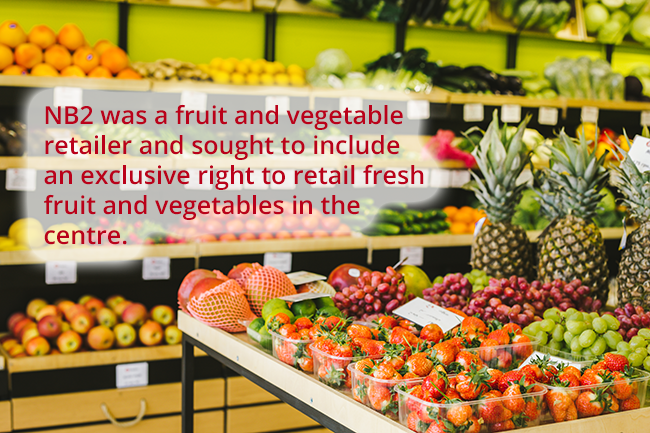Signing a retail lease is one of the most important business decisions you will make. It is therefore essential that your retail lease feature clear and explicit negotiated terms so that both parties are clear on how the lease is intended to operate. In other words you need to make sure that your lease says what you mean it to.
The recent case of NB2 Pty Ltd v P.T Ltd[1] reaffirmed this requirement and serves as a warning to retail tenants.
Summary of the Case NB2 Pty Ltd v P.T Ltd
In NB2 Pty Ltd v P.T Ltd,[2] the Tenant (NB2) negotiated a retail lease with the Landlord (P.T) for premises located in a Westfield Shopping Centre.

NB2 was a fruit and vegetable retailer and sought to include an exclusive right to retail fresh fruit and vegetables in the centre.
P.T agreed to include a clause in the retail lease that NB2 would have exclusivity to retail fresh fruit and vegetables in the centre (apart from Woolworths or similar retailer located at the other end of the centre). However, that right would only extend to NB2 as the sole ‘independent fresh fruit and vegetable retailer’.
However, just before the lease was signed, the Landlord had granted a competing fruit and vegetable retailer the right to open in the centre, near the tenant’s premises. The competing tenant resulted in a deterioration of NB2’s profits and subsequent default in rental payments.
NB2 entered into a dispute with P.T, arguing that the Landlord had made representations that it would have exclusive rights to retail fresh fruit and vegetables in the centre. They argued that P.T engaged in misleading and deceptive conduct by making representations regarding NB2’s ability to trade exclusively. NB2 further alleged that P.T had engaged in unconscionable conduct by not disclosing the fact it had allowed the competing retailer to trade.[3]
What did the Court say?
The Court determined that there was no misleading or deceptive conduct, nor unconscionable conduct. This was because the Landlord had not represented that the tenant would have complete exclusivity, rather that NB2 would be the ‘sole independent fruit and vegetable retailer’.[4] Instead, it was determined that the Tenant had entered the lease misunderstanding the terms. NB2 was ordered to pay the Landlord damages for its default.
The Landlord at no stage had made representations that the tenant would have exclusive rights to sell fresh fruit and vegetables. Therefore, there could be no misleading or deceptive conduct on behalf of the Landlord. Further, the Landlord was under no obligation to disclose to the tenant that new competition would be opening and as such there was no unconscionable conduct.
What this means for your retail lease
In this case, the dispute related to the different interpretation of  ‘independent’ by the tenant and Landlord. It means that simply stating your expectations to your Landlord is not enough, the lease needs to actually give effect to these expectations.
‘independent’ by the tenant and Landlord. It means that simply stating your expectations to your Landlord is not enough, the lease needs to actually give effect to these expectations.
If your retail lease is dependent on the use of specific words, it could be helpful to include a definitions section which clearly outlines key terms (e.g. an agreed definition of ‘independent fruit and vegetable retailer’). If you are seeking an exclusive right, ensure that this right is clearly outlined in the lease. For example, you could include a clause in the lease which states that the tenant will be protected from direct competition.
Further, just because commercial information was not disclosed during the negotiation of a retail lease, this does not mean that the Landlord engaged in misleading and deceptive conduct.
Key Lessons
- Does your retail lease reflect your commercial understanding of the agreement? Does it achieve the aims intended? Ensure that you review your retail lease and understand the terms contained. If you have any questions or do not understand any of the terms, ensure you seek independent legal advice.
- Record in writing any verbal representations made by either the Landlord. If you are unsure, ask the other party to confirm details prior to signing a lease.
- Understand that when negotiating the terms of an agreement there is no obligation for either party to disclose commercial information that may impact the entering of that contract (‘arm’s length’ rule).
- The lease contains the ultimate agreement and will be interpreted by the court if there is a dispute.
If you would like further information on this case, please click https://www.jade.io/article/571020
[1] NB2 Pty Ltd v P.T Ltd [2018] NSWCA 10.
[2] NB2 Pty Ltd v P.T Ltd [2018] NSWCA 10.
[3] Competition and Consumer Act 2010 (Cth) Schedule 2 (‘Australian Consumer Law’) ss 18,20.
[4] NB2 Pty Ltd v P.T Ltd [2018] NSWCA 10 per Macfarlan JA at [34].
This article by Elise Nisbet
 Elise Nisbet (LLB, GDLP, BCom (Hons)) is a qualified lawyer, working for a Top 50 ASX listed Company. She is an award-winning academic researcher and skilled legal writer with experience in banking and finance, corporate governance, risk management and compliance.
Elise Nisbet (LLB, GDLP, BCom (Hons)) is a qualified lawyer, working for a Top 50 ASX listed Company. She is an award-winning academic researcher and skilled legal writer with experience in banking and finance, corporate governance, risk management and compliance.
Last updated: 25 June 2019
Other Retail Leasing Resources
Ready-to-use Retail Lease kit includes everything you need to rent your shop premises
- Professionally drafted retail lease Agreement (doc)
- Professionally Drafted Disclosure statement
- Sample disclosure statement and Retail lease
- Easy to follow help guide
- Getting Started document
- Friendly customer support
Tenant Guide: How to find the Sweet Spot when negotiating a Retail (commercial) Lease
 Negotiating a commercial lease for the first time can be a little daunting. But like anything, it becomes easier once you’re familiar with the language and customs. We’ve outlined a list of the important factors to consider when you’re thrashing out the lease with your Landlord. It will help you to find that Sweet Spot where you both get a good deal out of the arrangement.
Negotiating a commercial lease for the first time can be a little daunting. But like anything, it becomes easier once you’re familiar with the language and customs. We’ve outlined a list of the important factors to consider when you’re thrashing out the lease with your Landlord. It will help you to find that Sweet Spot where you both get a good deal out of the arrangement.
Why do you need a Landlord’s Disclosure Statement?
 Landlords are required by law to provide a prospective tenant with a summary or disclosure statement of all the important terms of the proposed lease. We look at the reasons why it has to be done this way. Read more
Landlords are required by law to provide a prospective tenant with a summary or disclosure statement of all the important terms of the proposed lease. We look at the reasons why it has to be done this way. Read more


